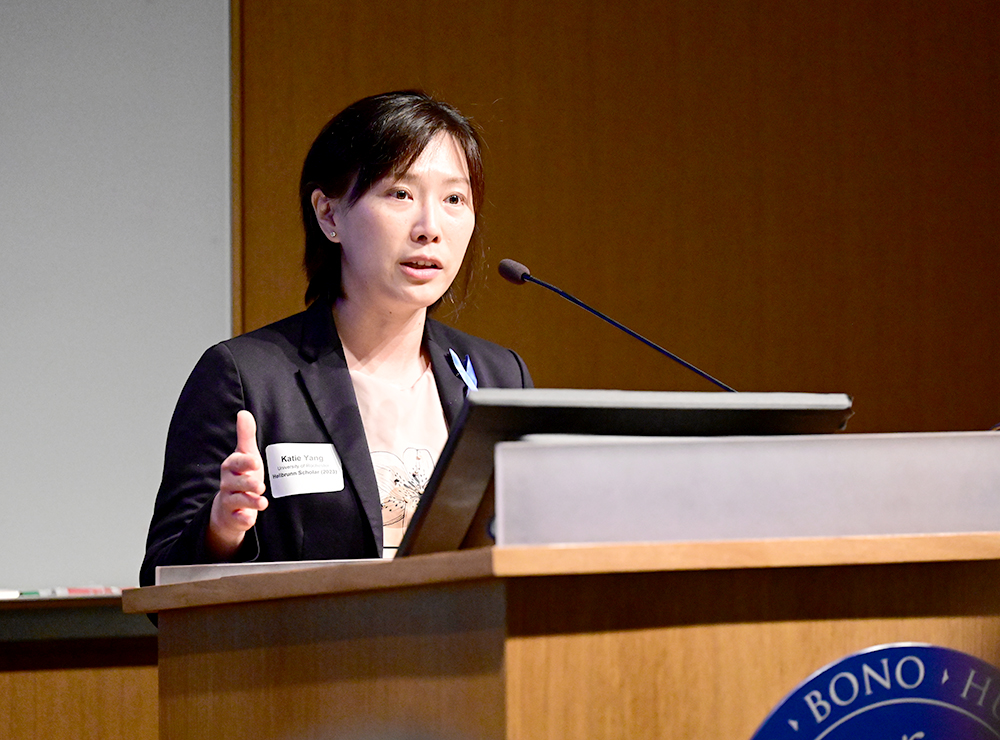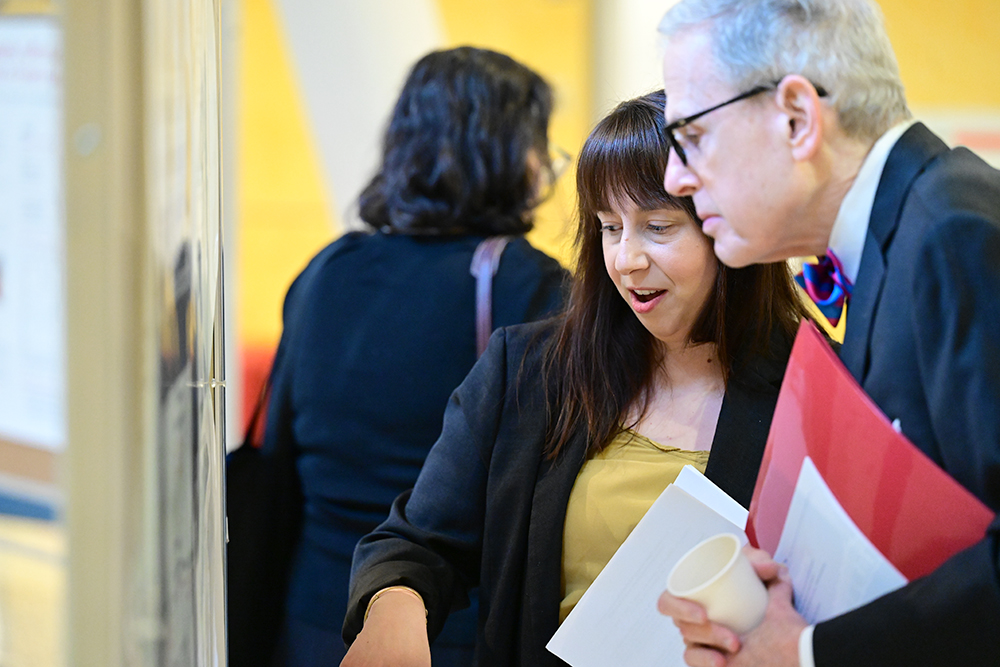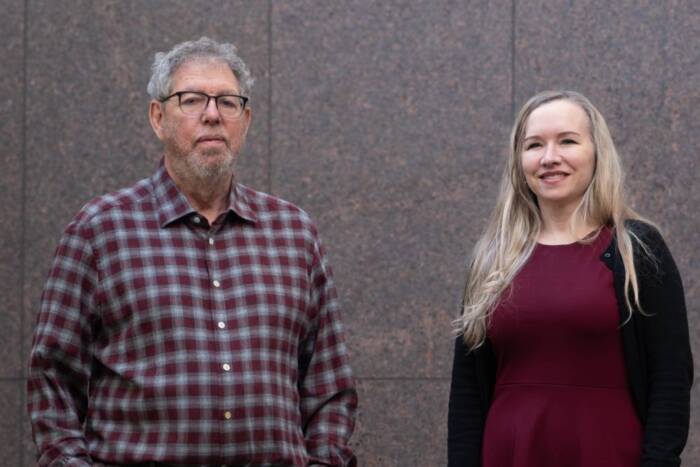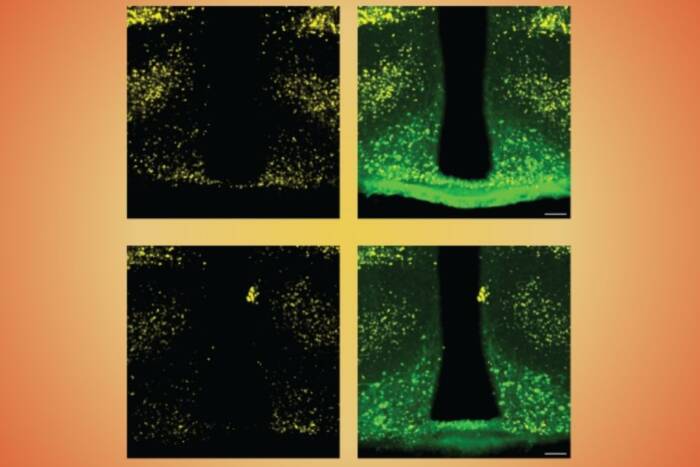Heilbrunn Nurse Scholar Award Celebrates 10 Years

Heilbrunn nurse scholar Katie Yang, a Ph.D. student at the University of Rochester, shares her findings on intuition and memory in clinical nursing practice. (Chris Taggart)
On May 15 and 16, the Heilbrunn Family Center for Research Nursing at The Rockefeller University marked the 10th anniversary of its prestigious Nurse Scholar Award, which provides up to $25,000 for independent research projects in the discipline. Because grant support for research in the field of nursing is limited, the award fills a critical funding gap.
After a welcome reception at the Rockefeller University Faculty Club on May 15, the center held a full-day scientific symposium in the Carson Family Auditorium on May 16. Speakers included Barry Coller, physician in chief of The Rockefeller University Hospital, and Candy Capili, director of the Heilbrunn center. Members of the Heilbrunn Extramural Research Nursing Advisory Committee, comprised of some of the country’s leading nursing scholars, also participated. Both current and former Heilbrunn Scholars awardees were also on hand to share research findings as well as details about the impact of their work.
“The Nurse Scholar Program is a crown jewel of our research nursing center,” said Coller. “We are so proud to host this wonderful celebration of all the nurse scholars supported by the center in its first decade. They’ve made major scientific and clinical contributions to improving the health of patients and their families, with a major focus on health disparities.”
A long tradition at Rockefeller

2016 Heilbrunn nurse scholar Dr. Paule Joseph, a Lasker clinical investigator at the NIH’s National Institute on Alcohol Abuse and Alcoholism (Chris Taggart)
Nurses have played an essential role in clinical studies at The Rockefeller University Hospital for more than a century. The Heilbrunn Center, located in the hospital, offers mentoring, scholarship, and program resources for clinical research nurses.
Nursing in these contexts requires a particular set of skills. Among other things, clinical nurses provide care to study participants, including administering investigational medications or treatments; ensure participant safety and ongoing informed consent; and collect data and process specimens. They’re often the first to learn cutting-edge therapies and techniques.
Rockefeller University Hospital is currently conducting human participant–based studies involving cancer, diabetes, heart disease, hepatitis B and C, HIV/AIDS, blood disorders, neurological disorders, the health impacts of racism, psoriasis, pregnancy, and many others.
Filling a critical funding gap
The Nurse Scholar Award began in 2014 with an endowment by Helaine Lerner and her sister Joan Rechnitz in honor of their parents Harriet and Robert Heilbrunn, after whom the center is named.
“The idea was to provide curricula and educational materials to encourage nursing students to consider careers in research nursing, to support the professional development of clinical research nurses in the hospital, and support nurse scientists developing their own independent projects,” said Capili. Nursing faculty, registered nurses in a doctoral program who have completed their dissertation defense, and postdoctoral fellows who are actively engaged in nursing science are eligible to apply for up to $25,000 for a one- or two-year project.
Each year, the board determines areas of focus based on important trends within the field. For the 2024 award cycle, the program encouraged proposals on maternal and child health, integrative medicine, and self-care.
Applications are peer reviewed by experts, and finalists are assessed by the Heilbrunn Extramural Nursing Advisory Research Committee, composed of some of the leading nurse scientists in the country.
“It’s a very rigorous process,” Capili said.
Research and community

Nurse scholar Shannon Gillespie of the Ohio State University College of Nursing discusses her research with Rockefeller physician in chief Barry Coller. (Chris Taggart)
The scientific symposium is annual, but this year’s event was special not only because it celebrated the 10th anniversary of the Nurse Scholar Award, but also because it was the first time the symposium has been held in person since before the COVID pandemic.
Former Heilbrunn scholars spoke about the role the program has played in their careers. One was Karen Jennings Mathis (2019), a research scientist at the Center for Behavioral and Preventive Medicine (CBPM) at Brown University’s Miriam Hospital. Her research focuses on disordered eating within Black populations. Another was Krista Knudson (2016), an assistant professor at Marquette University, where she studies improving survival rates and long-term outcomes for critically ill patients and their families.
Current scholars discussed their research projects, including Shuyan Huang, a doctoral fellow at New York University researching barriers to care for Chinese immigrant women with a history of gestational diabetes, and Katie Yang, a Ph.D. student at the University of Rochester studying intuition and memory in clinical nursing practice.
“The research conducted by Heilbrunn Nurse Scholars often focuses on understudied conditions and often hard-to-reach populations,” Capili said. “By touching the lives of those often left in the shadows, these scholars help forge a path toward health equity.”
The caliber of scholars who have participated in the research program has caught the attention of the wider nursing community, she noted. “As nursing professionals and researchers around the country have learned about the Heilbrunn Nurse Scholar Award, many are starting to see it as an early benchmark of success.”
Coller agreed, adding, “Our nurse scholars have gone on to outstanding careers in academia and government, garnering numerous awards for their research. Their successes inspire us to continue to fulfill our vision of promoting research nursing on a local, national, and international level.”


